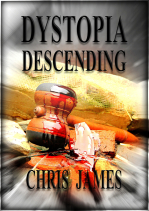Alchemy
 So my 2010 novel Class Action has now become my 2017 novel Dystopia Descending—but why? Since the modest success enjoyed by Repulse over the last year (and if you’re one of the 65 readers Repulse has gained so far this month, thank you), obviously I’m doing all I can to try to recreate this alchemy to keep gaining new readers. When Repulse took off, I had hoped it would lead to an increase in sales of my older titles, but I saw quickly that this didn’t happen. I took two of my earlier novels and rewrote them into one new novel, and changed the title to express the core belief in the story: Time Is the Only God, but that hasn’t sold beyond my blessed handful of devoted fans (well, both of them anyway). From January to June this year, I wrote The Repulse Chronicles, Book One: Onslaught, to give readers of Repulse an expanded, character-based version of that war which goes into far more detail, but so far Onslaught is also struggling to find its readership and is lagging far behind Repulse.
So my 2010 novel Class Action has now become my 2017 novel Dystopia Descending—but why? Since the modest success enjoyed by Repulse over the last year (and if you’re one of the 65 readers Repulse has gained so far this month, thank you), obviously I’m doing all I can to try to recreate this alchemy to keep gaining new readers. When Repulse took off, I had hoped it would lead to an increase in sales of my older titles, but I saw quickly that this didn’t happen. I took two of my earlier novels and rewrote them into one new novel, and changed the title to express the core belief in the story: Time Is the Only God, but that hasn’t sold beyond my blessed handful of devoted fans (well, both of them anyway). From January to June this year, I wrote The Repulse Chronicles, Book One: Onslaught, to give readers of Repulse an expanded, character-based version of that war which goes into far more detail, but so far Onslaught is also struggling to find its readership and is lagging far behind Repulse.
A few weeks ago, I was told that the reason Repulse did so well was that it was the right novel at the right time: a year ago, people were worried about terrorism and the Middle East, and Repulse appealed to those fears. This year, things have moved on, and the actions of the Feeble-Minded Simpleton currently pushing the world to the brink of war have many people worried that soon we really could be living in a dystopia. I believe that plenty of people in the “developed” world are so poor that they already consider themselves to be living in a dystopia, but I digress. Nevertheless, when that vicious, lying, narcissistic psychopathic, servile toady of the Kremlin was sworn in last January, not for nothing was the biggest selling novel in the US Orwell’s Nineteen Eighty-Four.
So, before I began writing The Repulse Chronicles, Book Two: Invasion, I decided to take another look at Class Action, and wondered if perhaps it wouldn’t be a bad time to try to get some more attention on it. The core idea of the novel is how a dystopia might happen. When I read voraciously in my teens, 20s and 30s, any dystopias I devoured would rarely describe how the fictional world got to that place; usually, the cause was some vaguely hinted-at nuclear or climate Armageddon. I always used to think that was such a cop-out: the author didn’t have the imagination to work out how the dystopia was brought into existence—how we got from here to there. So that’s what I wrote Class Action to do.
I’ve spent the last few weeks editing the text and have trimmed some fat, especially from the first half of the book, before the big plot twist halfway through. After seven years, I’m mildly surprised at how precious a writer I was back then, but also quite satisfied that predictions I imagined in 2009 still stand a fair chance of happening by 2032, when the story is set. In addition, I’ve also edited the story to accentuate its key point: how we get from here, our generally free and open democracy (despite its limits), to there, an actual dystopia where the ultra-wealthy from around the world have worked together to protect their privileges and crush even the remotest threat to their supremacy.
For those few of you who have read Class Action, Dystopia Descending is still the same novel, with the same events, characters, breathtaking action (*cough*) and amazingly prescient predictions (*choke*). But with a few tweaks and judicious editing, I’m trying once again to find the same elusive alchemy that made Repulse gain the number of readers that it has. Soon, Dystopia Descending will go on Kindle pre-order and I’ll probably set a release date around the beginning of December, while the Lulu paperback will go live in the next couple of weeks. If you read this blog, you’ll know about it. Thanks for reading.
[image error]





